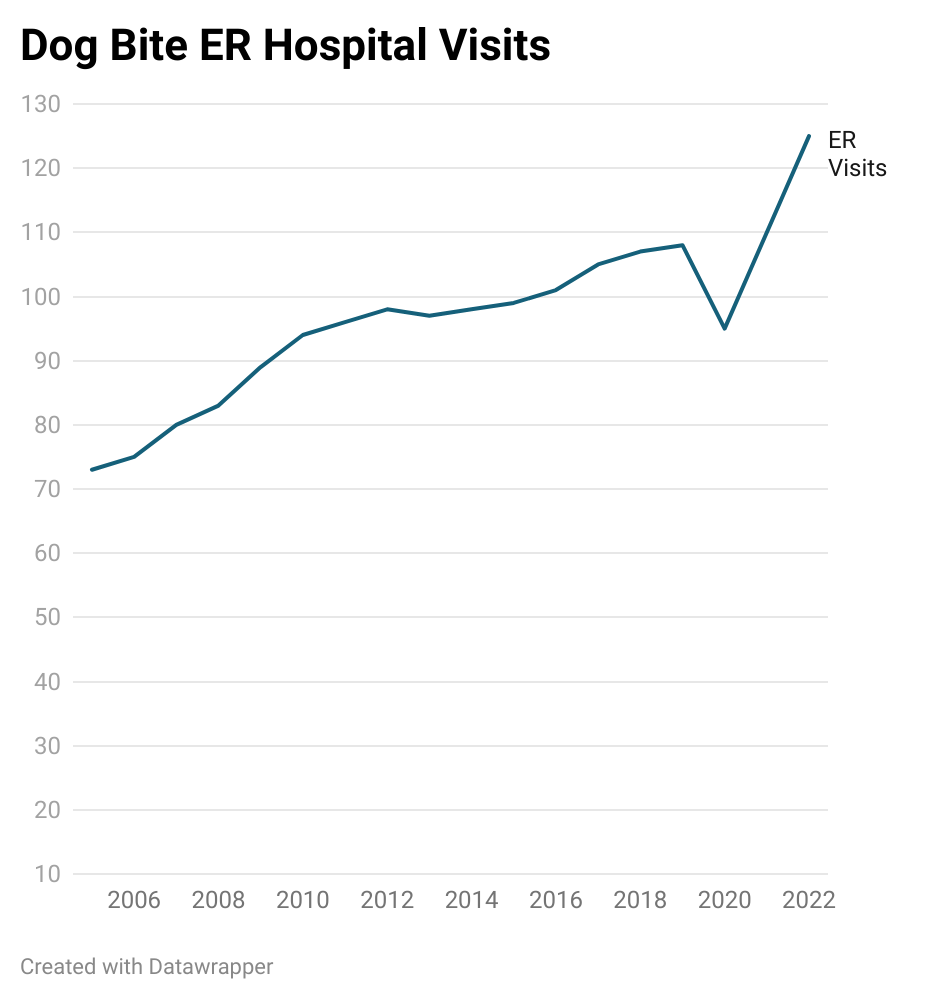In California, the risk of dog bites is more than just a passing concern. The state’s Department of Health Care Access and Information reported a significant 70% increase in dog bite-related emergency room visits since 2005, totaling 48,596 incidents in 2022 alone.


The aftermath of a dog bite in California can often feel overwhelming, but it’s important to know that you’re not without recourse. Amidst the physical and emotional trauma, there are several laws in place designed to protect and assist victims.
This guide helps you understand the California dog bite law and provides clarity on your rights and the legal options available.
- What Does California Law Consider as a Dog Bite?
- Who Is Liable for Dog Bite Injuries in California?
- California Dog Bite: Criminal Penalties
- What to do if Bitten by a Dog in California?
- What Is the Compensation for Dog Bite Victims in California?
- Filing a Lawsuit Under California Dog Bite Law
- Find Your Expert Dog Bite Lawyer With the Personal Injury Center
What Does California Law Consider as a Dog Bite?
In California, the definition of a dog bite in legal terms is broader than what might commonly be expected. The law considers a dog bite as any instance where a dog uses its teeth to seize, grip, or wound. (Johnson v. McMahan, 80 Cal.Rptr.2d 173 (Cal. App. 2d Dist. 1998))
This also includes situations where a dog might remove a part of something, or seize, pinch, or sever it with its jaws. The critical point here is that for an incident to be recognized as a dog bite under California law, it’s not necessary for the skin to be broken or for a wound to be visible.
Over the years, California has implemented several laws related to compensation and legal recourse in cases of injury due to a dog bite. These laws are designed to protect victims and provide them with avenues for seeking justice and compensation for their injuries and related losses.
Who Is Liable for Dog Bite Injuries in California?


California operates under a “strict liability” rule, distinctly different from the “one-bite” rule used in some other states. Under this rule, dog owners are responsible for most dog bite injuries without needing victims to prove the owner’s awareness of the dog’s aggressive nature.
Under the California Dog Bite Civil Code 3342, the liability of the dog owner doesn’t depend on their awareness of the dog’s potential danger or preventive measures taken.
The rule is straightforward: if a dog bite occurs, the owner is usually held responsible, regardless of the dog’s previous behavior or the owner’s attempts to prevent the incident. This legal standpoint significantly simplifies the process for victims seeking compensation for their injuries, highlighting the significant responsibility carried by dog owners.
We understand that understanding the legal framework around dog bite laws in California can be complex. The Personal Injury Center can be your go-to resource for a seamless connection with expert personal injury lawyers. We’re here to guide you to the right legal expertise, ensuring your rights are protected and you receive the fair compensation you deserve.
Exceptions to the Liability Rule
The California Dog Bite law, however, has its limitations. Some of the notable exceptions include:
- Trespassing: The law does not protect a victim if they were trespassing (entering someone’s land without permission) at the time of the bite. For strict liability to apply, the victim must have been on public property or lawfully on private property.
- Military or Police Dogs: In cases where a military or police dog bites or attacks while performing their duties, military and police agencies are exempt from strict liability standards.
- Provocation: If a victim provoked or harassed the dog before being bitten, they lose the right to pursue legal action under the strict liability rule. This condition is in place to ensure fairness in evaluating the events that led to the bite.
California Dog Bite: Criminal Penalties
In addition to civil liability, California law also imposes criminal penalties in certain dog bite cases. Under Cal. Penal Code § 399, these penalties can extend to individuals other than the owner, such as pet sitters or dog walkers, if they have “custody or control” of the dog at the time it causes injury. This aspect of the law ensures that anyone responsible for the dog at the time of an incident may be held accountable.
Furthermore, dog owners in California may face criminal charges if their dog causes injury while roaming freely, under two specific conditions:
- Prior Knowledge of Mischievous Behavior: The owner must have known that the dog had a propensity for mischievous or harmful behavior.
- Lack of Control: The owner failed to exercise sufficient control over the dog to prevent it from roaming at large.
What to do if Bitten by a Dog in California?
If you’re unfortunate enough to be bitten by a dog in California, responding swiftly and effectively is essential.


These steps are crucial not just for your health, but also for any future legal actions you might consider:
Seek Immediate Medical Attention
Your health is the top priority. Dog bites can lead to a range of serious infections and require immediate medical attention. Be aware that even bites that appear minor can pose risks such as tetanus or rabies, not to mention the possibility of nerve damage or severe tissue injury.
In many cases, homeowners’ insurance policies of the dog owner may cover the costs associated with dog bite injuries. It’s crucial to check if the owner’s insurance policy includes liability coverage for dog bites, as this can significantly ease the financial burden of medical treatments.
Report the Incident
Reporting the dog bite to local animal control or law enforcement is a must. This report serves as an important legal document and assists in tracking potentially dangerous dogs, thereby helping to prevent future incidents.
Under Cal. Food & Agric. Code §§ 31602, a “potentially dangerous dog” includes:
- A dog that, unprovoked, twice in 36 months, acts in a way that forces someone to defend themselves from bodily harm, off the owner’s property.
- A dog that, unprovoked, bites a person causing a less severe injury.
- A dog that, unprovoked, twice in 36 months, has attacked and caused injury or death to a domestic animal, off the owner’s property.
Gather and Exchange Information
Obtain the dog owner’s contact details, including their name, address, and phone number. Equally important is to collect information from any witnesses. Their accounts can provide invaluable support for your case. Additionally, ensure you provide your contact information to the dog owner.
Document the Evidence
Take detailed photographs of your injuries. Common injuries from dog bites include punctures, bruises, or torn muscles. Also, photograph the location of the incident and the dog itself, if it’s safe to do so. Maintain records of medical treatments, expenses incurred, and any work or activities you miss due to the injury. This documentation is vital for any potential legal claim.
Consult a Legal Expert
When dealing with the aftermath of a dog bite, it’s advisable to avoid direct negotiations about compensation or liability with the dog owner. Instead, consider reaching out to a personal injury lawyer with expertise in dog bite cases. Such legal professionals can provide valuable insight into your rights and assist you in navigating the legal process.
What Is the Compensation for Dog Bite Victims in California?


Under the California Dog Bite law, victims of dog bites are entitled to seek compensation that covers a wide range of damages. This law ensures that compensations are comprehensive, addressing both the immediate and long-term effects of a dog bite. Here’s an overview of the types of compensation available:
- Medical Expenses: This includes all medical costs incurred as a result of the dog bite. Victims can claim for emergency room visits, hospitalization, any required reconstructive surgery, and ongoing medical treatments. In cases where psychological counseling is necessary due to trauma from the incident, these costs can also be included in the compensation claim.
- Lost Wages: If you’ve missed work due to your injuries, you’re entitled to compensation for lost wages. This also extends to any future earning capacity that might be affected as a result of the dog bite. If the injuries lead to long-term disability or impair your ability to work as before, this factor is also considered in the compensation.
- Permanent Disfigurement or Scarring: If the dog bite results in permanent disfigurement or scarring, victims can seek compensation for these long-lasting physical changes. This aspect takes into account the impact on the victim’s appearance and the psychological effects associated with it.
- Emotional Distress: Dog bites can lead to significant emotional trauma. Compensation for emotional distress is meant to address the psychological impact of the incident, including anxiety, fear, and any other emotional suffering.
Getting compensation for your damages can be complex, but you don’t have to do it alone. The Personal Injury Center offers a helping hand by linking you with seasoned legal experts proficient in personal injury cases. They’ll guide you toward understanding your rights and securing the compensation you rightfully deserve.
Filing a Lawsuit Under California Dog Bite Law
When it comes to taking legal action for a dog bite incident in California, understanding the specific laws and requirements is crucial. Filing a lawsuit involves proving certain key elements as outlined in the state’s jury instructions and adhering to the statute of limitations.
Here’s what you need to know:
Key Elements to Prove in a Dog Bite Lawsuit
According to California’s jury instructions, a plaintiff (the injured person) in a dog bite lawsuit must establish the following:
- Ownership of the Dog: The plaintiff must prove that the defendant is the owner of the dog that caused the bite.
- Location of the Incident: The bite must have occurred in a public place or while the plaintiff was lawfully on private property.
- Suffered Harm: It’s necessary to show that the plaintiff suffered harm as a result of the bite.
- Dog’s Role in the Harm: The plaintiff must demonstrate that the defendant’s dog was a substantial factor in causing the harm.
Successfully proving these elements can lead to the recovery of monetary damages for the victim. For more in-depth guidance, check out this helpful video:
California Dog Bite Statue of Limitations
In California, legal actions for dog bite incidents are classified under personal injury law. Accordingly, they follow the state’s personal injury statute of limitations. This specific statute states that:
- A lawsuit related to a dog bite must be filed within a two-year window starting from the date the injury occurred.
It’s crucial to note that this two-year deadline is strictly applied. Missing this deadline usually means losing the right to file a lawsuit. However, some exceptions can extend this deadline, such as cases involving a minor or when the injury wasn’t immediately noticeable.
Find Your Expert Dog Bite Lawyer With the Personal Injury Center
Navigating the aftermath of a dog bite in California can be overwhelming, especially when it involves legal proceedings. That’s precisely where The Personal Injury Cente steps in, offering a guiding hand through these complexities.
We’re committed to connecting you with an expert lawyer in your area, skilled in navigating the complexities of dog bite cases. Reach out and we’ll partner you with legal support tailored to your needs.
Key Takeaways
|



